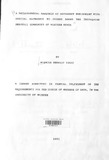| dc.description.abstract | This thesis addresses itself to deterrence as an aspect of utilitarian punishment. It attempts to critically evaluate the role of deterrence as a goal of utilitarian punishment in curbing crime in society. To show this, the study has selected a specific community in Kenya, the Abagusii, who in their traditional practice of punishment utilised the cultural belief of the case to curtail criminal behaviour in the community.
This research adopted the following as its specific hypothesis:
Curses among the traditional Abagusii community were an effective form of deterrent punishment.
To test this hypothesis, library research was conducted with the following objectives:
a) An examination of the practice of curses among the traditional Abagusii community;
b) A critical examination of the role of curses in regulating the socio-political and economic lives of the traditional Abagusii .
....-
iii
The study has shown that the fear of the curses among the traditional Abagusii was very strong and was instilled through the socio-cultural and traditional religious practices of the Abagusii. It was because of their strong belief in religion that they believed curses were occurrences controlled by the supernatural
forces who could unleash the curses on social
deviants.
Because
of this, curses among the
indigenous Abagusii played an effective deterrent role as a form of punishment. The hypothesis, therefore, is affirmed.
The recommendation arising from this study is that if the belief in curses is enforced in modern societies through a vigorous system of socialisation, the rate of crime in society may be reduced . This socialisation could be carried out through such institutions as the family, the school, the church, etc.
In summary, the layout of the thesis is such that Chapter One begins with the ethnographic background of the Abagusii community. The problem and objectives of the study are also treated in this Chapter, as are the justification of the study, the theoretical framework, hypothesis and methodology.
Chapter Two comprises the literature review. It is also in this Chapter that the definitions of
punishment and curses are given. Among the issues dealt with here include the theories of punishment and arguments that have been advanced for ard against punishment. Deterrence as a form of util itar ian punishment, curses as tools of social control and examples of curses practised among the traditional Abagusii are also examined here.
Chapter three explores some of the important Gusii socialisation processes. It is shown how each of the socialisation process discussed contributes in inculcating the belief in curses among the Gusii people.
Chapter Four critically examines the role of curses in the administration of punishment, the possible philosophical foundations of curses and the role of punishment in ensuring social conformity of the traditional Abagusii.
In conclusion, Chapter Five looks at the future of punishment in the light of the controversy surrounding the practice. This Chapter also looks at the ,concept of oath-taking in modern society and the atti tudes of people towards it. It then ends by giving recommendations on possible ways of salvaging
the credibility of deterrent punishment . | en |

